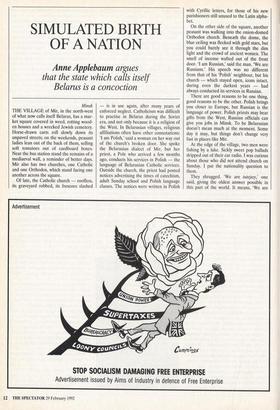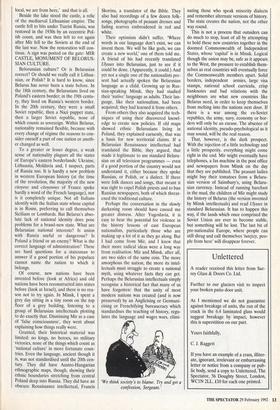SIMULATED BIRTH OF A NATION
Anne Applebaum argues
that the state which calls itself Belarus is a concoction
Minsk THE VILLAGE of Mir, in the north-west of what now calls itself Belarus, has a mar- ket square covered in weed, rotting wood- en houses and a wrecked Jewish cemetery. Horse-drawn carts roll slowly down its unpaved streets; on the weekends, peasant ladies lean out of the back of them, selling soft tomatoes out of cardboard boxes. Near the bus station stand the remains of a mediaeval wall, a reminder of better days. Mir also has two churches, one Catholic and one Orthodox, which stand facing one another across the square.
Of late, the Catholic church — roofless, its graveyard robbed, its frescoes slashed
— is in use again, after many years of enforced neglect. Catholicism was difficult to practise in Belarus during the Soviet era, and not only because it is a religion of the West. In Belarusian villages, religious affiliations often have other connotations: 'I am Polish,' said a woman on her way out of the church's broken door. She spoke the Belarusian dialect of Mir, but her priest, a Pole who arrived a few months ago, conducts his services in Polish — the language of Belarusian Catholic services. Outside the church, the priest had posted notices advertising the times of catechism, adult Sunday school and Polish language classes. The notices were written in Polish
with Cyrillic letters, for those of his new parishioners still unused to the Latin alpha- bet.
On the other side of the square, another peasant was walking into the onion-domed Orthodox church. Beneath the dome, the blue ceiling was flecked with gold stars, but you could barely see it through the dim light and the crowd of ancient women. The smell of incense wafted out of the front door. 'I am Russian,' said the man. 'We are Russians.' His speech was no different from that of his 'Polish' neighbour, but his church — which stayed open, icons intact, during even the darkest years — had always conducted its services in Russian.
There are good reasons to be one thing, good reasons to be the other. Polish brings you closer to Europe, but Russian is the language of power. Polish priests may bear gifts from the West, Russian officials can give you jobs in Minsk. To be Belarusian doesn't mean much at the moment. Some day it may, but things don't change very fast in places like Mir.
At the edge of the village, two men were fishing by a lake. Sickly sweet pop ballads dripped out of their car radio. I was curious about those who did not attend church on Sunday. I put the nationality question to them.
They shrugged. 'We are tutejszy,' one said, giving the oldest answer possible in this part of the world. It means, 'We are
local, we are from here,' and that is all.
Beside the lake stood the castle, a relic of the mediaeval Lithuanian empire. The castle fell to bits under Tsarist Russia, was restored in the 1930s by an eccentric Pol- ish count, and was then left to rot again after Mir fell to the Soviets at the end of the last war. Now the restoration will con- tinue. A sign was posted on the gate: MIR CASTLE, MONUMENT OF BELORUS- SIAN CULTURE.
Belorussian culture? Or is Belarusian correct? Or should we really call it Lithua- nian, or Polish? It is hard to know, since Belarus has never been a state before. In the 18th century, the Belarusians lived on Poland's eastern border; in the 19th centu- ry, they lived on Russia's western border. In the 20th century, they were a small Soviet republic, then a Nazi puppet state, then a larger Soviet republic, none of which counts as sovereign. Within Belarus, nationality remained flexible, because with every change of regime the reasons to con- sider oneself a part of one nation or anoth- er changed as well.
To a greater or lesser degree, a weak sense of nationality plagues all the states of Europe's eastern borderlands: Ukraine, Lithuania, Moldavia and, I suspect, parts of Russia too. It is hardly a new problem in western European history (at the time of the revolution, the majority of the new citoyens and citoyennes of France spoke hardly a word of the French language), nor is it completely unique. Not all Italians identify with the Italian state whose capital is in Rome, preferring to call themselves Sicilians or Lombards. But Belarus's abso- lute lack of national identity does pose problems for a brand-new state. What are Belarusian national interests? Is union with Russia useful or dangerous? Is Poland a friend or an enemy? What is the correct language of administration? These are hard questions for a statesman to answer if a good portion of his populace cannot name the nation to which it belongs.
Of course, new nations have been invented before (look at Africa) and old nations have been reconstructed into states before (look at Israel), and there is no rea- son not to try again. In Minsk, I spent a grey day sitting in a tiny room on the top floor of a grey building, listening to a group of Belarusian intellectuals plotting to do exactly that. Dismissing Mir as a case of 'false consciousness', they went about explaining how things really were.
Granted, their historical material was limited: no kings, no heroes, no military victories, none of the things which count as 'national culture' in more fortunate coun- tries. Even the language, ancient though it is, was not standardised until the 20th cen- tury. They did have Austro-Hungarian ethnographic maps, though, showing their ethnic boundaries stretching from central Poland deep into Russia. They did have an obscure Renaissance intellectual, Francis Skorina, a translator of the Bible. They also had recordings of a few dozen folk- songs, photographs of peasant dresses and fading scarves embroidered in red and white.
Their optimism didn't suffer. 'Where words in our language don't exist, we can invent them. We will be like gods, we can create a new world,' one of them told me. A friend of his had recently translated Ulysses into Belarusian, just to see if it could be done. (Apparently, it could.) And yet not a single one of the nationalists pre- sent had actually spoken the Belarusian language as a child. Growing up in Rus- sian-speaking Minsk, they had studied their 'native' language as adults. Their lan- guage, like their nationalism, had been acquired; they had learned it from others.
From others they also acquired the tech- niques of using their discovered knowl- edge to create new policies. If old maps showed ethnic Belarusians living in Poland, they explained earnestly, that was a basis for new territorial claims. If a Belarusian Renaissance intellectual had translated the Bible, they argued, that made it legitimate to use standard Belaru- sian on all television programmes — even if a good portion of the country would not understand it, either because they spoke Russian, or Polish, or a dialect. If there were folk dances and songs, that meant it was right to expel Polish priests and to ban Russian newspapers, both of which threat- ened the traditional culture.
Perhaps the conversation in the slowly darkening room should have caused me greater distress. After Yugoslavia, it is easy to hear the potential for violence in the history lessons of east European nationalists, particularly those who are making up a lot of it as they go along. But I had come from Mir, and I knew that their more radical ideas were a long way from realisation. Mir and Minsk, after all, are two sides of the same coin. The more amorphous the nation, the more its intel- lectuals must struggle to create a national myth, using whatever facts they can get. Perhaps the Belarusian intellectuals simply recognise a historical fact that many of us have forgotten: that the unity of most modern nations was created (and is now preserved) by an Anglicising or Germani- cising or Frenchifying bureaucracy which standardises the teaching of history, regu- lates the language and wages wars, elimi-
'We think society's to blame. Try and get a confession, Sergeant.'
nating those who speak minority dialects and remember alternate versions of history. The state creates the nation, not the other way round.
This is not a process that outsiders can do much to stop, least of all by attempting to hold these new countries together in the doomed Commonwealth of Independent States, whose 'capital' is in Minsk. Logical though the union may be, safe as it appears to the West, the pressure to establish them- selves as real countries will eventually force the Commonwealth members apart. Solid borders, independent armies, large visa stamps, national school curricula, crisp banknotes and bad relations with the neighbours are what new countries like Belarus need, in order to keep themselves from melting into the nations next door. If there is a war among the ex-Soviet republics, the army, navy, economy or bor- ders will only be an excuse. The absence of national identity, pseudo-psychological as it may sound, will be the real reason.
That, however, is the dark prospect. With the injection of a little technology and a little prosperity, everything might come right in the end. Mir might eventually have telephones, a fax machine in the post office and newspapers from Minsk on the day that they are published. The peasant ladies might buy their tomatoes from a Belaru- sian version of Sainsbury's, using Belaru- sian currency. Instead of running barefoot in the mud, the children of Mir might study the history of Belarus (the version invented by Minsk intellectuals) and read Ulysses in standard Belarusian. It has to happen this way, if the lands which once comprised the Soviet Union are ever to become stable, but something will be lost. The last bit of pre-nationalist Europe, where people can still shrug and call themselves `tutejszy, peo- ple from here' will disappear forever.



















































 Previous page
Previous page